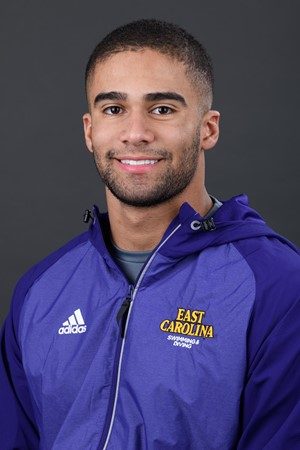Two years ago, Gustavo Santos was trying to adjust to life in the United States. He couldn’t speak English very well, practices were run differently than in Brazil and he had rarely competed in a short-course pool.
Last week at the Georgia Tech Invitational, Santos gave a clear indication that he had fully acclimated to life as an American collegiate swimmer. He won the 100-meter butterfly, besting competitors from three ACC and three SEC schools, making the NCAA “B” qualifying time and winning the American Athletic Conference Swimmer of the Week honor in the process.
Santos is one of the most promising Pirate prospects on a roster that is 50 percent populated by newcomers, said head swimming and diving coach Matt Jabs.
“He does everything the right way,” said Jabs, who is in his second year leading the ECU program. “He comes in here and works hard on a daily basis. He makes good choices, and he is very coachable, which makes a huge difference. Last year was really a breakthrough year for him.”

As a sophomore, Santos was the American champion in the 100 butterfly, and he was also a member of three conference champions relay teams. He also set the ECU record in the 100 fly (a record that he broke at the Georgia Tech meet), and he was named the Pirates’ Most Outstanding Swimmer.
Swimmers like Santos, who have competed overseas only in long-course pools measured in meters instead of yards, have a steep learning curve when they arrive in the States, Jabs said, especially since they have to adjust to taking more turns and swimming underwater more.
Since it is a sport of inches in which every little thing matters, Santos’s evolution as a Pirate speaks to his willingness to push himself hard every day. With a winning Georgia Tech time of 46.16, the second fastest in his career, Santos earned a No. 6 national ranking and the top spot in the American in that event. Also at that meet, he was part of the 200 freestyle relay team that set a new school record.
It was the last team meet of 2018 for the team, which will take a break from competition and lean heavily into training until January 12, when they will swim in three events in preparation for the American Championships at the end of February.
“I’m very happy with my results,” said Santos, who narrowly missed qualifying for the national meet in the 100 fly last season. “I feel like I still have a lot more to improve in small details, and that’s going to make a big difference this year in conference. I feel like the whole team was engaged in the meet, and the way we are approaching the dual meets this year is different, too. We’re way more confident, I think.”
Competitive swimming is all that Jabs has ever known, but he understands that the collegiate swimming season is a bit atypical — a full slate of meets in the fall, a six-to-eight-week period of intensive training, followed by the final push toward conference and the postseason.
The next month or so won’t exactly be a holiday vacation for the swimmers and divers. As Jabs says, “It gets a little bit rough. We bang on them pretty hard.”
But the goal is to build on the triumphs of the fall and put in the adjustments that will push them to achieve even bigger things in the new year.
“For the most part, you’re in the water all the time,” Jabs said of the high-level swimming culture. “If you want to be elite, you don’t get to have any down time. Going into this part we train, train, train — taking the successes we had at Georgia Tech and being happy with them but not being satisfied with them.”
Leave a Reply